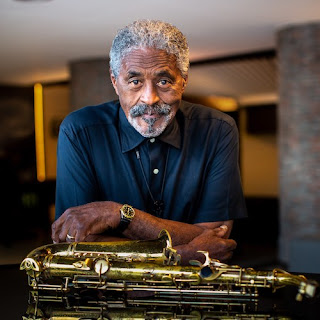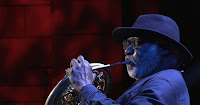The music of Charles Mingus is so rich and rewarding, there are three repertory ensembles dedicated to performing it: the Mingus Big Band, the Mingus Orchestra, and the seven-piece Mingus Dynasty, all of whom operated under the watchful eye of his widow, Sue Mingus, until her death earlier this year. It will be the Big Band who have the opportunity to introduce Mingus’s music to PBS viewers hoping to get a little hipper. Their concert celebrating the Mingus centennial (4/22/1922-1/5/1979), Let My Children Hear Mingus airs this Friday, launching PBS’s newest performing arts showcase, Next at the Kennedy Center.
Despite some interview segments featuring bassist Christian McBride, Jason Moran, and Robert Glasper, the Mingus Big Band performs most of the music, which makes sense, since they are the experts. However, they are joined by one legendary guest, alto saxophonist Charles McPherson, who was a long-time Mingus sideman, as well as a leader in his own right. Clint Eastwood relied on McPherson perform the original alto solos for his Charlie Parker bio-picture Bird, so you know he is the real deal—and he still sounds great.
“Boogie Stop Shuffle” is an appropriately up-tempo opener for the Big Band on their own and “Peggy’s Blue Skylight” is a beautiful showcase for McPherson. Reflecting the preoccupation at PBS for social issues, we get not one but two renditions of Mingus’s scathing segregation protest song, “Fables of Faubus,” one from the Big Band (featuring Frank Lacy’s vocals) and another from Moran, in a duet with vocalist Georgia Anne Muldrow, laying electronic supplements over his piano. Moran and Muldrow also interpret “Goodbye Pork Pie Hat,” Mingus’s elegy to Lester Young.
However, the Big Band and McPherson are a better fit for Mingus’s “So Long Eric,” a more rousing but equally mournful tribute, aptly written in honor of his lifelong friend, Eric Dolphy. You have to give bassist, music director Boris Kozlov credit for nailing the bass intro, while McPherson plays with the kind of passion Mingus always demanded of his band.
In fact, this is by far, the best number included in the broadcast. It really captures the excitement of live performance, especially when McPherson and the rest of the sax section take turns soloing. It ends with an archival Mingus performance of “Don’t Let It Happen Here,” again, emphasizing Mingus’s political themes. (Of course, viewers cannot simply enjoy music, they have to be assured of its “relevancy,” right?)
Every selection is indeed highly representative of Mingus, but it misses a few opportunities. Mingus’s “Haitian Fight Song” is one of those songs a lot of people don’t know they love (having been used in a popular Volkswagen commercial back in 2001) and “Hog Callin’ Blues” has an infectious energy few tunes have ever matched.
Regardless, it is a joy to see McPherson and the Mingus Big Band get this much national airtime. They deserve it and so do Mingus’s compositions. Highly recommended for the music (the commentary is mostly filler), Next at the Kennedy Center: Let My Children Hear Mingus premieres Friday night (10/14) on PBS.

